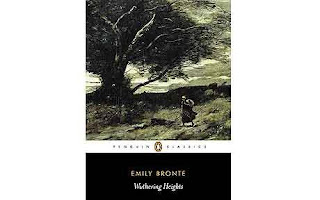Keeping with the theme for trying to read broadly, and reading the classics to improve my own writing, I decided to read Emily Bronte's Wuthering Heights.
I didn’t have an expectations when I began reading Wuthering Heights, except that I had heard people talk it being a great love story. I don’t know why people consider it a great love story - it certainly is a fantastic story, but it’s not a romance!
I think it is a novel of despair and redemption. There are a lot of ‘what ifs’ raised during the reading of it. I remember hearing someone saying that if Heathcliff had not left the kitchen when Catherine said that she couldn’t lower herself to marry him, and actually heard how much she loved him, it would have turned out very differently. Certainly, there would not have been so much despair and redemption if Heathcliff had married Catherine. However, he still seemed set on bringing Earnshaw down. He may have done that anyway. Also, Heathcliff’s and Catherine’s personalities were such that they would have caused a lot of trouble for everyone if they teamed up.
The narration of the story is very interesting, going from Mr Lockwood to Mrs Dean, and even Cathy and Heathcliff’s house-keeper have a role in narrating. They all tell the story consistently, and stay true to things like Joseph’s accent. It wasn’t very believable that each would narrate in the same way.
I considered Mrs Dean to be very culpable in the events. She was always helping couples meet, which caused everything to go wrong in the first place. If she had not conspired with the young people, but been faithful to her masters in each circumstance, things could have turned out very differently.
Bronte was able to create fantastic, unique characters. Even the setting was a character, in a way - the lonely moors, the isolation, the cold. Heathcliff’s character is one of the most unique and interesting characters that I have ever discovered in a novel. Is he evil, or a product of his circumstances? I think he is evil. Certainly, his circumstances were horrible - tortured and loving a woman who he couldn’t have. But many people and characters have experienced those things. It is the way he reacts, and systematically goes about bringing down everyone that he hates. He takes everything off them and makes them miserable, and drives them to death. All for revenge. He doesn’t need the money, and in fact, when he finally succeeds in owning everything and controlling everyone, there’s nothing left for him to do but go crazy and kill himself. I don’t feel any pity for Heathcliff.
I think it was a very satisfying story, in that there is light at the end of the tunnel, and good prevailed over evil in the end. The weather and the landscape all seem to contribute to the good feeling at the end of the novel, as well. Spring, new growth, warmth, and the beginning of new happiness.



